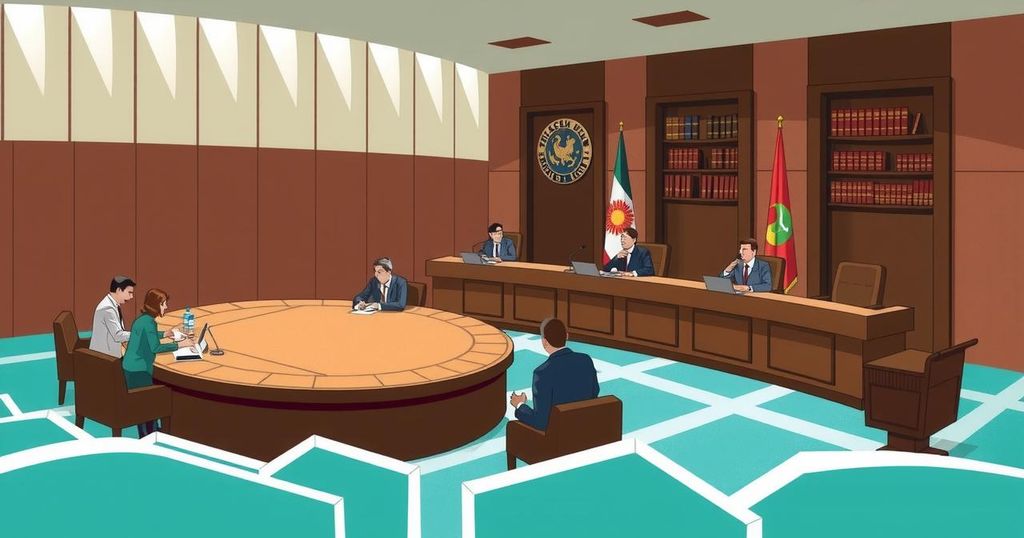The Philippines and Bangladesh have urged the International Court of Justice to recognize climate change as a violation of international law. This request follows COP29’s insufficient climate finance outcomes. The hearings also focus on the legal responsibilities of major greenhouse gas emitters and the potential for climate reparations for vulnerable nations. A strong advisory opinion from the ICJ could influence legal accountability and future climate negotiation frameworks.
The Philippines and Bangladesh have appealed to the International Court of Justice (ICJ) to acknowledge climate change as a breach of international law. This extraordinary request occurs in the concluding week of the landmark hearings at the ICJ in The Hague, following COP29, where expectations for climate finance for vulnerable nations were unmet. The ICJ hearings are viewed as a vital step toward advancing claims for climate reparations, stemming from prolonged advocacy by Pacific student groups and small island states. Additionally, discussions during the hearings have underscored the responsibility of significant polluters for the ongoing climate emergency.
Philippine representative Carlos Sorreta articulated the nation’s position, emphasizing that customary international law obligates states to prevent transboundary harm and uphold environmental standards. He suggested the adoption of the unique Philippine writ of kalikasan, which guarantees citizens’ rights to a healthy environment, as a model for international law. In a parallel statement, Bangladesh’s representative Tareque Muhammad positioned climate change as a human rights concern, imploring the court to define the responsibilities of nations in light of the persisting climate crisis. Muhammad expressed confidence that the ICJ could provide clarity on these obligations, particularly concerning major polluters.
The discussions included perspectives from Indonesia, which argued against specific international obligations regarding climate protection under human rights law, asserting that any such responsibilities ought to be limited to national territory. Contrarily, youth movements advocating for climate justice criticized this restrictive interpretation, asserting it limits legal avenues to tackle climate challenges effectively.
Leading emitters such as the United States and China contended that existing frameworks suffice to address climate issues, yet experts warned against misusing the Paris Agreement to evade accountability. Should the ICJ issue a robust advisory opinion, it might delineate the legal responsibilities nations hold regarding climate impacts, influencing forthcoming climate negotiations and supporting demands for climate finance and reparations for loss and damage. This opinion could serve as a crucial reference for climate litigation and potentially alleviate political stagnation at the anticipated COP30 summit in Brazil next year, rendering states more accountable for their climate actions.
Furthermore, advocates stress that the court’s advice could bolster the legal standing of climate-vulnerable nations while clarifying the obligations of developed states to remedy climate-related damages. The forthcoming advisement from the ICJ is expected to be pivotal in shaping both international law and climate policy for future generations, ensuring accountability for current and past pollution actions.
In light of the escalating impacts of climate change, several nations, particularly those vulnerable to such changes, are pursuing legal recognition of climate harm as a violation of international law. With ongoing hearings at the International Court of Justice, climate-vulnerable nations such as the Philippines and Bangladesh seek to highlight the legal responsibilities of larger polluters under international law. The discussions aim to enhance accountability mechanisms that could support claims for climate reparations and a more equitable approach to climate finance, specifically in the aftermath of insufficient outcomes from international climate conferences.
In conclusion, the recent appeals made by the Philippines and Bangladesh to the International Court of Justice signify a critical juncture in the quest for legal recognition of climate change impacts on vulnerable nations. By positioning climate change as a violation of international law, these nations aim to compel accountability among major polluters, while advocating for enhanced reparations and climate finance measures. The ICJ’s forthcoming advisory opinion could profoundly influence international climate law and negotiations, establishing clearer legal responsibilities among states and supporting future generations in their environmental advocacy efforts.
Original Source: www.eco-business.com






